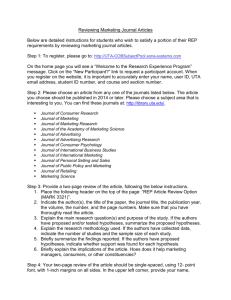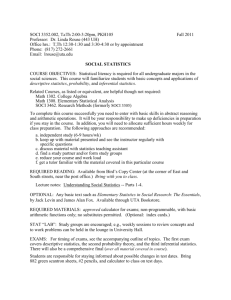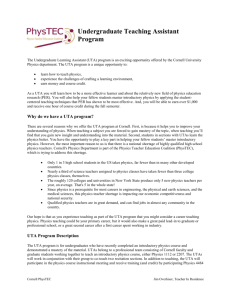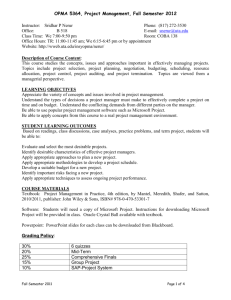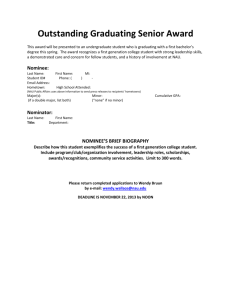PSY 401 - nau.edu - Northern Arizona University
advertisement
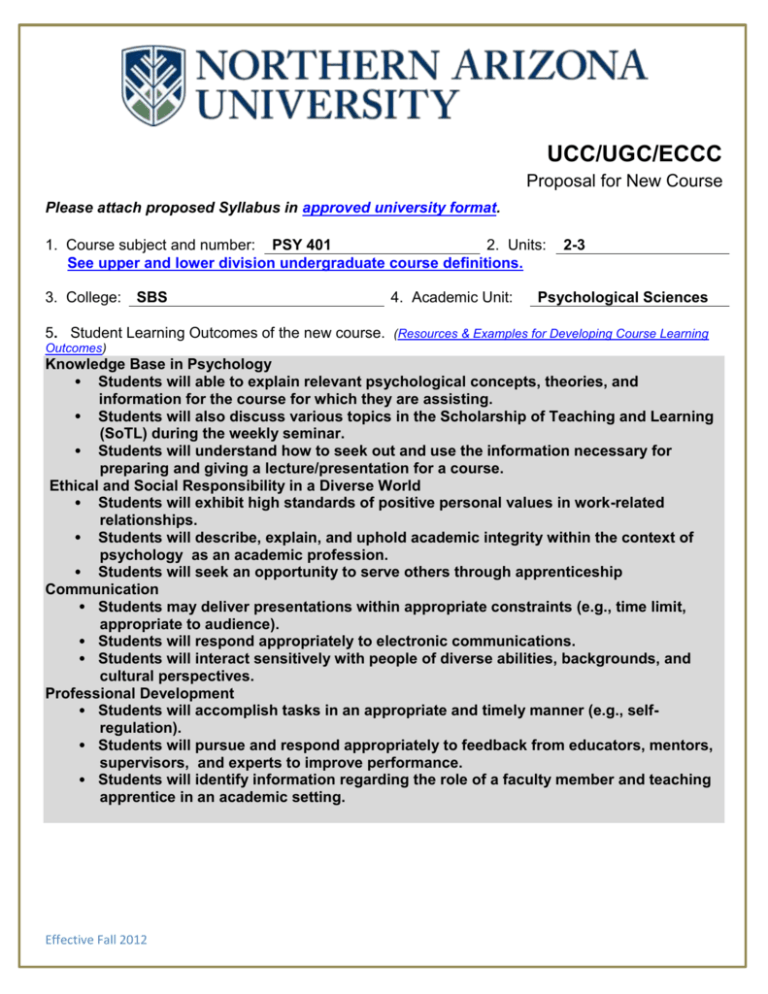
UCC/UGC/ECCC Proposal for New Course Please attach proposed Syllabus in approved university format. 1. Course subject and number: PSY 401 2. Units: See upper and lower division undergraduate course definitions. 3. College: SBS 4. Academic Unit: 2-3 Psychological Sciences 5. Student Learning Outcomes of the new course. (Resources & Examples for Developing Course Learning Outcomes) Knowledge Base in Psychology Students will able to explain relevant psychological concepts, theories, and information for the course for which they are assisting. Students will also discuss various topics in the Scholarship of Teaching and Learning (SoTL) during the weekly seminar. Students will understand how to seek out and use the information necessary for preparing and giving a lecture/presentation for a course. Ethical and Social Responsibility in a Diverse World Students will exhibit high standards of positive personal values in work-related relationships. Students will describe, explain, and uphold academic integrity within the context of psychology as an academic profession. Students will seek an opportunity to serve others through apprenticeship Communication Students may deliver presentations within appropriate constraints (e.g., time limit, appropriate to audience). Students will respond appropriately to electronic communications. Students will interact sensitively with people of diverse abilities, backgrounds, and cultural perspectives. Professional Development Students will accomplish tasks in an appropriate and timely manner (e.g., selfregulation). Students will pursue and respond appropriately to feedback from educators, mentors, supervisors, and experts to improve performance. Students will identify information regarding the role of a faculty member and teaching apprentice in an academic setting. Effective Fall 2012 6. Justification for new course, including how the course contributes to degree program outcomes, or other university requirements / student learning outcomes. (Resources, Examples & Tools for Developing Effective Program Student Learning Outcomes). The department does not currently have a course that provides for the acquisition of supervised peer teaching experience. This supervised course will provide students the opportunity to learn about the development, presentation and teaching of Psychology at the college level. 7. Effective BEGINNING of what term and year? See effective dates calendar. Fall 2015 8. Long course title: UNDERGRADUATE TEACHING APPRENTICE (max 100 characters including spaces) 9. Short course title: UNDERGRD TEACHING APPRNTC (max. 30 characters including spaces) 10. Catalog course description (max. 60 words, excluding requisites): Teaching apprenticeship under the supervision and approval of an instructor. 11. Will this course be part of any plan (major, minor or certificate) or sub plan (emphasis)? Yes If yes, include the appropriate plan proposal. Psychological Sciences; B.A. (elective), Psychological Sciences; B.S. (elective) No 12. Does this course duplicate content of existing courses? Yes No If yes, list the courses with duplicate material. If the duplication is greater than 20%, explain why NAU should establish this course. 13. Will this course impact any other academic unit’s enrollment or plan(s)? Yes No If yes, describe the impact. If applicable, include evidence of notification to and/or response from each impacted academic unit 14. Grading option: Letter grade Pass/Fail Both 15. Co-convened with: 14a. UGC approval date*: (For example: ESE 450 and ESE 550) See co-convening policy. *Must be approved by UGC before UCC submission, and both course syllabi must be presented. 16. Cross-listed with: (For example: ES 450 and DIS 450) See cross listing policy. Please submit a single cross-listed syllabus that will be used for all cross-listed courses. 17. May course be repeated for additional units? 16a. If yes, maximum units allowed? 6 16b. If yes, may course be repeated for additional units in the same term? Effective Fall 2012 Yes No Yes No 18. Prerequisites: INSTRUCTOR CONSENT If prerequisites, include the rationale for the prerequisites. The prerequisite is necessary for the student to demonstrate competency in the required core knowledge base, empirical knowledge base and theoretical foundations for which they will apprentice. 19. Co requisites: If co requisites, include the rationale for the co requisites. 20. Does this course include combined lecture and lab components? Yes If yes, include the units specific to each component in the course description above. 21. Names of the current faculty qualified to teach this course: No All faculty 22. Classes scheduled before the regular term begins and/or after the regular term ends may require additional action. Review “see description” and “see impacts” for “Classes Starting/Ending Outside Regular Term” under the heading “Forms” http://nau.edu/Registrar/Faculty-Resources/Schedule-of-Classes-Maintenance/. Do you anticipate this course will be scheduled outside the regular term? Yes No 23. Is this course being proposed for Liberal Studies designation? If yes, include a Liberal Studies proposal and syllabus with this proposal. Yes No 24. Is this course being proposed for Diversity designation? If yes, include a Diversity proposal and syllabus with this proposal. Yes No Answer 22-23 for UCC/ECCC only: FLAGSTAFF MOUNTAIN CAMPUS Scott Galland Reviewed by Curriculum Process Associate 1/21/2015 Date Approvals: Heidi A. Wayment Department Chair/Unit Head (if appropriate) 2/17/2015 Chair of college curriculum committee Date Effective Fall 2012 Date Dean of college Date For Committee use only: UCC/UGC Approval Approved as submitted: Approved as modified: EXTENDED CAMPUSES Date Yes Yes No No Reviewed by Curriculum Process Associate Date Approvals: Academic Unit Head Date Division Curriculum Committee (Yuma, Yavapai, or Personalized Learning) Date Division Administrator in Extended Campuses (Yuma, Yavapai, or Personalized Learning) Date Faculty Chair of Extended Campuses Curriculum Committee (Yuma, Yavapai, or Personalized Learning) Date Chief Academic Officer; Extended Campuses (or Designee) Date Approved as submitted: Approved as modified: Yes Yes No No From: Heidi A Wayment Sent: Tuesday, February 17, 2015 4:17 PM To: Stuart S Galland Subject: RE: APPROVAL REQUEST: PSYBA, PSYBS, PSYBAv2, PSY401, PSY 302W-490C, PSYMA Hi Scott, I've signed all the docs, thanks! Please let me know if anything is missing. Heidi Heidi A. Wayment, Ph.D. Professor and Chair Department of Psychological Sciences Effective Fall 2012 Psychology 401 PROPOSAL/SYLLABUS Undergraduate Teaching Apprentice (UTA) Fall 2015 INSTRUCTOR: Ann Collier, Ph.D. OFFICE: SBS 242 Email: ann.collier@nau.edu Meets: By appointment Course Value: 2-3 credit hours per semester; course may be repeated with a maximum of 6 credit hours. Course enrollment includes mandatory participation in UTA weekly meetings (1 hour/week). During the first week of the semester, all students enrolled in this course will successfully complete FERPA training: http://nau.edu/registrar/ferpa/ (see Start FERPA tutorial). Prerequisites: Instructor consent is required. Instructors will determine if you have successfully completed of PSY 101, PSY 230, PSY 302W; have had a grade of “B” or better in the class that you are an UTA for; Psychology GPA of “B” or 3.0 or better; and junior or Senior status. 30-WORD COURSE CATALOG DESCRIPTION Teaching apprenticeship under the supervision and approval of an instructor. Course can be taken for 2-3 credit hours per semester and repeated with a maximum of 6 credit hours. Pass-fail only. Consent of instructor and Junior and Senior status required for enrollment. GENERAL COURSE DESCRIPTION: PSY 401 will provide students with a collegial, challenging, and rewarding experience; students will learn about the development, presentation, and teaching of Psychology. This course will provide students with an understanding about what goes into the teaching of Psychology at a college level. While enrolled as an UTA, you must attend a weekly seminar on the teaching of Psychology with all other UTAs (this will be required even if you are enrolled as an UTA more than once). The Instructor and UTA should discuss detailed expectations for the UTAship, prepare, and then sign a written contract formalizing their agreement. Instructors may either use the generic departmental contact form (attached) or create an individualized contract. The contract will be signed by the Instructor, the UTA and then by the Department Chair for final approval. At minimum, the contract will specify: the specific responsibilities of the UTA, including attending the weekly UTA seminar attendance guidelines specific to the class you will be UTA for the educational objectives of the UTA the mechanism by which the UTA and the instructor will evaluate the UTA experience Effective Fall 2012 the method(s) by which the Instructor will train the UTA in relevant tasks in addition to or separate from the UTA teaching seminar a description of the plan for monitoring the accuracy of the UTA’s work how the Instructor will determine the UTA’s grade (if applicable) how the UTA will receive student feedback about her/his performance Suggestions for the activities include the following: Meeting for 30–45 minutes each week with the course instructor (at a mutually agreed-upon time) to engage in course-planning and evaluation activities Holding office hours to help students with assignments and exam preparation Assisting with the identification and creation of resources that demonstrate critical issues in a specific area (e.g., articles for review, videos, etc.) Assisting student groups in the laboratory with project related issues, such as research design and statistics Assisting with grading assignments, under supervision of the Instructor Assisting with coordination of group data collection processes Assisting with enhancement and maintenance of the course Bb Learn site Assisting with creation of assignment and examination materials Coordinating and holding review sessions for students Guest lecturing, under supervision of the Instructor Assisting with the review of draft surveys and/or posters Maintaining list of posters completed by class TEACHING SEMINAR: The teaching seminar involves a semi-structured forum to discuss the scholarship of teaching. Topics will include (but are not limited to): ethical issues (e.g., professional boundaries, dealing with conflict of interests, etc.); how to develop lectures, teach labs, and lead discussions; how to develop tests; use of PowerPoint and Prezi in presentations; developing your teaching style; faculty-student relationships; using teaching technology; and conducting research and literature reviews. Because important ethical issues are reviewed early in the seminar, attendance is mandatory during the first week of class or you will be dropped from the UTA course. You will be expected to write 3 reflection papers on relevant topics regarding the teaching of Psychology; these will not require more than 1-2 hours each to complete. COURSE MATERIALS: Teaching Psychology: A Step by Step Guide by Sandra Goss Lucas and Douglas A. Bernstein (2005). New Jersey: Lawrence Erlbaum Associates, Inc. LEARNING EXPECTATIONS / OUTCOMES FOR THIS COURSE Because each student will develop individualized learning outcomes, the assessment methods will be identified by the individual instructor and student in the UTA contract. Department Learning Goal Knowledge Base in Psychology PSY 401 Learning outcomes Effective Fall 2012 Students will able to explain relevant psychological concepts, theories, and information for the course for which they are assisting. Students will also discuss various Assessment of Learning Objectives (suggested activities) Attending at lectures, or labs Reading about teaching of Psychology Critiquing class lectures/activities Preparing handouts/guides Ethical and Social Responsibility in a Diverse World Communication Professional Development topics in the Scholarship of Teaching and Learning (SoTL) during the weekly seminar. Students will understand how to seek out and use the information necessary for preparing and giving a lecture/presentation for a course. Students will exhibit high standards of positive personal values in workrelated relationships. Students will describe, explain, and uphold academic integrity within the context of psychology as an academic profession. Students will seek an opportunity to serve others through apprenticeship experience. Students may deliver presentations within appropriate constraints (e.g., time limit, appropriate to audience). Students will respond appropriately to electronic communications. Students will interact sensitively with people of diverse abilities, backgrounds, and cultural perspectives. Students will accomplish tasks in an appropriate and timely manner (e.g., self-regulation). Students will pursue and respond appropriately to feedback from educators, mentors, supervisors, and experts to improve performance. Students will identify information regarding the role of a faculty member and teaching apprentice in an academic setting. Developing and presenting lectures Conducting critical thinking activities in classroom or lab Conducting study sessions Consulting with individual students enrolled in class Passing grade on 3/3 reflection papers BB Learn Training: to be given by supervisor FERPA Training NAU CERT training (conflict of interest) Student crisis management training Passing grade on 3/3 reflection papers Critiquing class lectures/activities Conducting classroom activities/demonstrations Conducting critical thinking activities/exercises Presenting lectures Leading discussion groups Conducting study sessions Consulting with individual students Reading about the teaching of psychology Assisting Instructor in scoring assignments and quizzes/exams Regular attendance at all predetermined meetings with Instructor to discuss teaching of Psychology Passing grade on 3/3 reflection papers REQUIRED MATERIALS: To be determined by instructor. However, most communication in this course will happen via e-mail. It is important that you regularly check your NAU e-mail account or have it forwarded to an e-mail account you regularly check. You are responsible for all materials sent via e-mail. ATTENDANCE: Again, all UTAs are required to attend the 1-hour weekly UTA seminar. You must attend the first 2 seminars or you will not be allowed to continue your enrollment as an UTA. Attendance at 80% of these seminars is required to receive a passing grade in the overall course; this means you can only miss 2 seminars during the entire semester but they cannot be the first 2 week of the semester. Aside from the seminar, UTA schedules are decided on individual bases; students are required to follow this schedule. If students need to miss a day, they must notify Dr. Collier at least 24 hours in advance by text, call, or email (when possible – I understand that emergencies happen). UTA hours Effective Fall 2012 are calculated by the accepted standard of 3 hours of work for each credit hour (e.g., 3 credit hours = 9 hours per week). CLASSROOM ETIQUETTE: While working as an UTA, students are expected to maintain a standard of professionalism with other students, faculty, and administrative staff. To this end, students are expected to keep conversations quiet to minimize interruptions to the classroom. Profanity should never be used with other students. E-mail is the primary mode of communication, so you are expected to check your email on a daily basis and respond within 24-48 hours or less. Although we do not adopt a strict dress code, we ask that UTAs dress appropriately for their position. Fellow students look to the UTAs as representatives, and UTAs are often a person of authority in the room. Jeans and t-shirts are acceptable, but low-cut blouses, shirts with profane or inflammatory messages, dirty-looking clothing, etc. are discouraged. GRADING POLICY: Your grade for PSY 401 is Pass/Fail and will be based on the specifics of your contract with the Instructor, as well as 80% attendance for the UTA seminar, in order to receive a passing grade in the course. During the first week of the semester, each student and instructor will complete an individualized learning outcome plan that includes individualized assessment, thereby creating the customized UTA contract. The instructor and student will also determine how each of these components will be weighted. At the end of the semester, the instructor will then determine if the student has met 70% or greater of these objectives; students will receive a “Pass” if he/she attended 80% of the UTA seminars and the contract total is 70% or greater; students will receive a “Fail” if the contract objectives are met at less than 70% or he/she did not attend 80% of the UTA seminar. Again, attending the UTA seminar less than 80% is grounds for failure, even if the contract objectives are completed successfully. For example, if a contract specifies: 1) Knowledge base (30% total) includes attending 70% of lectures and developing and presenting one lecture; 2. Ethical and Social Responsibility (20%) includes successfully completing BB Learn Training, FERPA and NAU CERT training; 3) Communication (30%) includes conducting two classroom demonstrations (not including lecture) and consulting with individual students during weekly office hours; and 4) Professional Development (20%) includes reading weekly assignments about the teaching of psychology and writing three 2page reaction papers as well as attending 90% of meetings with the instructor; than the student must receive a summary score of 70% on these components and have attended 80% of the UTA seminar in order to receive a “Pass” grade. REQUIRED TRAINING: BB Learn Training: to be given by supervisor FERPA Training o http://nau.edu/Registrar/FERPA/Tutorial/tutorialpages/Ferpa-Tutorial/ o http://nau.edu/registrar/ferpa/tutorial/quiz/ NAU CERT training (conflict of interest) Student crisis management training Effective Fall 2012 NORTHERN ARIZONA UNIVERSITY POLICY STATEMENTS FOR COURSE SYLLABI SAFE ENVIRONMENT POLICY NAU’s Safe Working and Learning Environment Policy prohibits sexual harassment and assault, and discrimination and harassment on the basis of sex, race, color, age, national origin, religion, sexual orientation, gender identity, disability, or veteran status by anyone at this university. Retaliation of any kind as a result of making a complaint under the policy or participating in an investigation is also prohibited. The Director of the Office of Affirmative Action & Equal Opportunity (AA/EO) serves as the university’s compliance officer for affirmative action, civil rights, and Title IX, and is the ADA/504 Coordinator. AA/EO also assists with religious accommodations. You may obtain a copy of this policy from the college dean’s office or from the NAU’s Affirmative Action website nau.edu/diversity/. If you have questions or concerns about this policy, it is important that you contact the departmental chair, dean’s office, the Office of Student Life (928-523-5181), or NAU’s Office of Affirmative Action (928) 523-3312 (voice), (928) 523-9977 (fax), (928) 523-1006 (TTD) or aaeo@nau.edu. STUDENTS WITH DISABILITIES If you have a documented disability, you can arrange for accommodations by contacting Disability Resources (DR) at 523-8773 (voice) or 523-6906 (TTY), dr@nau.edu (e-mail) or 928-523-8747 (fax). Students needing academic accommodations are required to register with DR and provide required disability related documentation. Although you may request an accommodation at any time, in order for DR to best meet your individual needs, you are urged to register and submit necessary documentation (http://www.nau.edu/dr) 8 weeks prior to the time you wish to receive accommodations. DR is strongly committed to the needs of student with disabilities and the promotion of Universal Design. Concerns or questions related to the accessibility of programs and facilities at NAU may be brought to the attention of DR or the Office of Affirmative Action and Equal Opportunity (523-3312). ACADEMIC CONTACT HOUR POLICY Based on the Arizona Board of Regents Academic Contact Hour Policy (ABOR Handbook, 2-224), for every unit of credit, a student should expect, on average, to do a minimum of three hours of work per week, including but not limited to class time, preparation, homework, studying. ACADEMIC INTEGRITY Integrity is expected of every member of the NAU community in all academic undertakings. Integrity entails a firm adherence to a set of values, and the values most essential to an academic community are grounded in honesty with respect to all intellectual efforts of oneself and others. Academic integrity is expected not only in formal coursework situations, but in all University relationships and interactions connected to the educational process, including the use of University resources. An NAU student’s submission of work is an implicit declaration that the work is the student’s own. All outside assistance should be acknowledged, and the student’s academic contribution truthfully reported at all times. In addition, NAU students have a right to expect academic integrity from each of their peers. Individual students and faculty members are responsible for identifying potential violations of the university’s academic integrity policy. Instances of potential violations are adjudicated using the process found in the university Academic Integrity Policy. RESEARCH INTEGRITY The Responsible Conduct of Research policy is intended to ensure that NAU personnel including NAU students engaged in research are adequately trained in the basic principles of ethics in research. Additionally, this policy assists NAU in meeting the RCR training and compliance requirements of the National Science Foundation (NSF)-The America COMPETES Act (Creating Effective Fall 2012 Opportunities to Meaningfully Promote Excellence in Technology, Education and Science); 42 U.S.C 18620-1, Section 7009, and the National Institutes of Health (NIH) policy on the instruction of the RCR (NOT-OD-10-019; “Update on the Requirement for Instruction in the Responsible Conduct of Research”). For more information on the policy and the training activities required for personnel and students conducting research, at NAU, visit: http://nau.edu/Research/Compliance/Research-Integrity/ SENSITIVE COURSE MATERIALS University education aims to expand student understanding and awareness. Thus, it necessarily involves engagement with a wide range of information, ideas, and creative representations. In the course of college studies, students can expect to encounter—and critically appraise—materials that may differ from and perhaps challenge familiar understandings, ideas, and beliefs. Students are encouraged to discuss these matters with faculty. CLASSROOM DISRUPTION POLICY Membership in the academic community places a special obligation on all participants to preserve an atmosphere conducive to a safe and positive learning environment. Part of that obligation implies the responsibility of each member of the NAU community to maintain an environment in which the behavior of any individual is not disruptive. Instructors have the authority and the responsibility to manage their classes in accordance with University regulations. Instructors have the right and obligation to confront disruptive behavior thereby promoting and enforcing standards of behavior necessary for maintaining an atmosphere conducive to teaching and learning. Instructors are responsible for establishing, communicating, and enforcing reasonable expectations and rules of classroom behavior. These expectations are to be communicated to students in the syllabus and in class discussions and activities at the outset of the course. Each student is responsible for behaving in a manner that supports a positive learning environment and that does not interrupt nor disrupt the delivery of education by instructors or receipt of education by students, within or outside a class. The complete classroom disruption policy is in Appendices of NAU’s Student Handbook. Effective Summer 2014 Approved UCC – 1/28/14 Approved UGC – 2/12/14 Undergraduate Teaching Apprentice (UTA) in Psychology Contract Psychology 401 UTA Name UTA Username UTA Student ID # ___________________________________ Faculty Mentor(s’) Name(s) Faculty Course Number and Title Term/Year Number of credits (2 or 3) **[Expectation: 3 work hours/week per credit. All students are expected to attend a one hour weekly meeting, regardless if enrolled in 2 or 3 credits or if student has taken the course before. Psyc 401 may be repeated with a maximum of 6 credit hours. Course enrollment includes mandatory participation in UTA weekly meetings (1 hour/week)]. Verification of Eligibility Criteria: Criterion UTA has completed this course (or equivalent) with a grade of B or better UTA has a Psychology GPA of 3.00 or higher Effective Fall 2012 Instructor Initials UTA has successfully taken the perquisite courses PSY 101, PSY 230, PSY 302W Instructor consent Junior or Senior Status By initialing below, both the Instructor and the UTA verify that the UTA has received specific training on the topics listed below. Training on these topics is required for UTAs assisting with all courses in the Department of Psychology. The Instructor is responsible to ensure that such training is of adequate breadth and depth to prepare the UTA to conduct herself/himself in a responsible manner, consistent with Department guidelines for Student Academic UTAs. Topic Date of Training Instructor Initials UTA Initials Confidentiality Policy (FERPA) BB Learn Student crisis management training NAU CERT training Responsibilities of the UTA (check all that apply): attending lectures attending labs reading about the teaching of Psychology critiquing class lectures/activities preparing handouts/guides developing critical thinking activities/exercises developing lectures conducting classroom activities/demonstrations conducting critical thinking activities/exercises presenting lectures leading discussion groups conducting study sessions consulting with individual students assisting Instructor in scoring assignments assisting Instructor in scoring quizzes/exams other (describe) other (describe) Educational objectives of the UTA Effective Fall 2012 Mode of Delivery Mechanism by which the UTA and the Instructor will evaluate or assess the UTA learning objectives Responsibilities of the Instructor Method(s) by which the Instructor will train the UTA in relevant tasks Specialized skills, knowledge, and/or ethics information needed for effective completion of intended UTA tasks, if applicable Effective Fall 2012 Plan for providing training in the specialized skills, knowledge, and/or ethical issues listed above, if any Plan for evaluating or assessing achievement of training in the specialized skills, knowledge, and/or ethical issues listed above, if any Plan for monitoring the accuracy of the UTA’s work Additional methods by which the Instructor will determine the UTA grade (if applicable) Mechanism by which the UTA will receive student feedback about her/his performance Signatures: UTA Date Instructor(s) Date Department chair Date Effective Fall 2012
